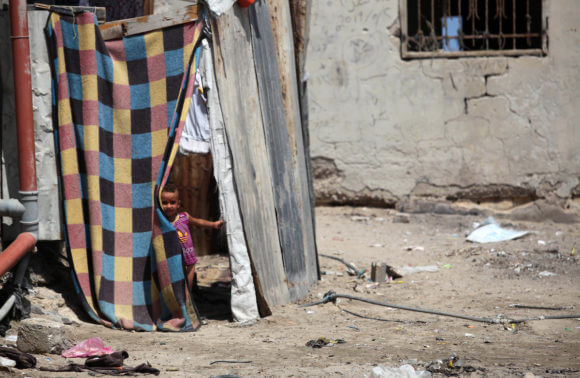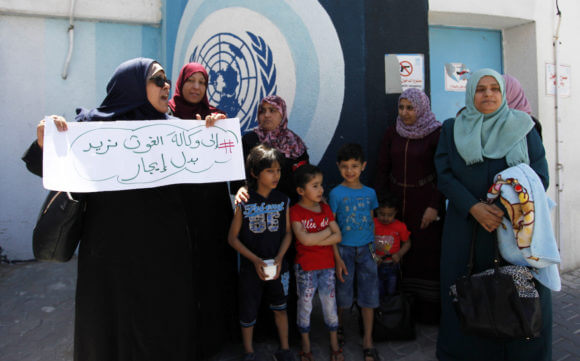Update — September 26, 2019: Today, UNRWA reneged on the agreement with the families described below, saying it would not start until another employment program for needy family concludes. And although that latter program is scheduled to conclude at the end of that month, it could be renewed.
“All we know now is that they [UNRWA] will employ us in the‘coming months.’ What that really means, we don’t know,” explains Mahmoud al-Gherbawi, a representative for the families who also received rent subsidies.
Original Post:
Palestinian recipients of aid have accused the United Nations agency tasked with supporting Palestinian refugees, or UNRWA, of exploitation after being required to work in return for rent stipends for families whose homes were destroyed in the 2014 war. UNRWA suspended the program in the midst of a financial crisis last year triggered by the Trump administration’s decision to cut agency funding. After more than 100 families protested inside of a UN medical clinic from April until the end of July, UNRWA then agreed to restore the assistance in a work exchange.
The rent-for-work program covering a total of 600 families will begin in October.
“The families protested out of desperation; they had no place to live,” explains Mahmoud al-Gherbawi, a representative for the families who also received rent subsidies. “We staged a sit-in on the second floor of the clinic, where the administrative and public relations offices were located. Our presence didn’t impede the work of the clinic at all,” he said.
However, UNRWA Operations Director in Gaza Matthias Shamali “threatened to close the clinic to pressure us into evacuating. We held firm and finally, Matthias suggested that one person from each of the 600 families work in exchange for the stipend,” al-Gherbawi said.
The agreement falls short of al-Gherbawi’s expectations. He insists aid should be disbursed without a work requirement or suggested if UNRWA wants Palestinians to work, it should pay a salary. The rent subsidies are given at a rate of $200 per month. Al-Gherbawi said that it is far lower than salaries paid by the UN to local staff which he estimates is between $300 and $800 per month.
“We refused at first because we should receive salaries if we work. But after deep thinking, we accepted. We have no other alternatives. Still, we feel exploited,” he said.
Thousands still displaced from the 2014 war
The houses of more than 100,000 Palestinians were damaged or destroyed in the 2014 war, forcing many to seek refuge in UNRWA schools. After the war ended, the Palestinian governments in both Gaza and the West Bank slowly started funding their reconstruction. However, five years later, about 13,000 people have not returned to their homes. Many remain in temporary quarters arranged by the UN as construction continues, and many have been forced to move repeatedly after apartment owners raised rents following a surge in demand.
Then the Trump administration announced last year that it would stop funding its share (about a third) of UNRWA’s $1.1 billion budget.
In response, UNRWA made deep cuts. Beyond suspending rent payments, jobs and programs were slashed. Anticipating Palestinians who had received UNRWA stipends would no longer be able to pay their rent, a number of landlords announced deadlines for the families to pay off overdue balances. Some families were evicted, and others were sentenced to prison over their increasing debts.
“UNRWA was originally established to provide assistance to Palestinians made into refugees by the Nakba (“catastrophe,” or creation of Israel). Since then, many of us have been displaced multiple times, with every war,” says al-Gherbawi.

Asmaa’s story
Asmaa al-Nahhal, 30, belongs to one of these families. Her husband is employed by the Palestinian Authority in the West Bank, which pays him approximately $397 [1,400 NIS] per month—not much considering their four children. They had purchased an apartment unit from a bank, paying in installments. The bank garnished $115 from her husband’s salary each month.
At the time of the 2014 war, her husband was in Lebanon visiting his brother and his mother who is a widow. While she was alone with the children, she received notice her building would be targeted. The family immediately fled. The Israeli military then struck the building with a drone, destroying the property and belongings of every family living there.
Al-Nahhal and her children sought refuge in a nearby relative’s house. But there wasn’t enough room, so she took the children to a nearby UNRWA school, where they lived in one classroom with six other families for more than 50 days.
“My sister had already gone to our parents’ house with her five children and husband, so we couldn’t stay there; it was overcrowded,” al-Nahhal recalls. “I wished my husband was with us to give me strength!”
During the last five years, the family has moved from one neighborhood to another, attempting to find and stay in a cheap apartment, triggering a decline in their children’s academic achievements.
Their continuous displacement has not yet ended. After UNRWA terminated the family’s rent stipend, they were evicted from their home. Their furniture was also seized until their rent was paid. With nowhere else to settle, the clinic where the sit-in took place became their shelter.
“My children and I lived in one room in the clinic with three other families. My husband lived with his parents and his unmarried siblings in a house that is too small for us all,” explains al-Nahhal.
Once the families agreed to UNRWA’s settlement, however, she and the kids left the clinic and are living in her in-laws’ house until they can find an apartment. The solution offered by UNRWA, in which al-Nahhal will do work for the agency, will allow them to rent gain, but they are not pleased with the agency.
“Since our houses were demolished in the war, we have been refugees,” she says. “And instead of helping us by paying our rent, they are exploiting our dire need for money.”
The Nasser family
Nasser Abu Nahel, a father of four children, has been in a similar situation and was imprisoned when he could not pay his debts. He doesn’t work because he has heart disease that makes any exertion dangerous. His family’s only income is a disability payment of about $567 every three months.
Abu Nahel and his family had been living in a home provided by the Ministry of Public Works and Housing until the 2014 war, when Israeli forces leveled the building. Like other families, they took refuge in a neighborhood UNRWA school for about two months.
“My wife and kids lived in one of the school corridors, since there wasn’t enough space in the classrooms, while I moved back home to my dad’s house. But there wasn’t enough space there for us all,” he remembers. “I have two other married siblings.”
Since then, the family has rented an apartment—that is, until UNRWA stopped their rent stipend. They stayed as long as they could, but then they were evicted and Abu Nahel was imprisoned for not paying the rent.
“During my imprisonment, my health deteriorated because I was unable to take my medication,” he adds.
The UNRWA deal means his wife will go to work for the agency in return for help with rent. But Abu Nahel, like the others, believes housing is a right given the price they have paid in the wake of the war. And any employee should receive a proper salary. “UNRWA is using our lack of money to get ‘free’ work. This is unacceptable from an organization whose purpose is to provide us assistance when we are victimized.”


